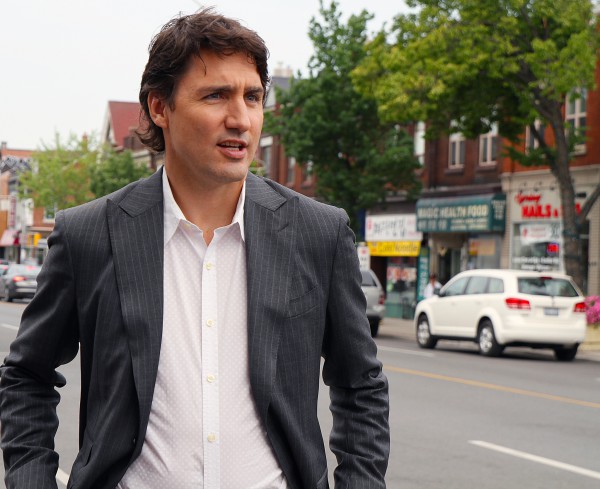Liberal leader says he doesn’t care who you vote for as long as you vote

The Leader of the Liberal Party of Canada, Justin Trudeau, campaigning for Adam Vaughan in Toronto’s Trinity-Spadina riding in June 2014. Photo: Alex Guibord (CC BY 2.0)
Spencer Van Dyk
The Fulcrum (University of Ottawa)
OTTAWA (CUP)—Liberal Party leader Justin Trudeau said he doesn’t care who you vote for in the upcoming election as long as you vote.
In a youth issues-centric, live-streamed town hall with Vice on Oct. 5, Trudeau answered questions about missing and murdered Aboriginal women, the legalization of marijuana, Bill C-51, the refugee crisis and LGBTQ rights. In his final moments, he said Conservative Party leader Stephen Harper doesn’t want youth to vote, so the importance is not who you vote for, but that you vote.
“If a young person doesn’t vote, you are still voting,” he said. “You’ve actually given a double vote to someone who is voting and may disagree with you.”
“Stephen Harper doesn’t want you to vote,” he continued. “Stephen Harper is actually counting on it.”
Trudeau encouraged youth to take 20 minutes to look at who is representing the constituencies. He said there are good people running everywhere, so it’s important to figure out who is in line with your values.
He said the current government is inaccessible because it has marginalized the media and minimized contact with people, which is “not what a digital, engaged democracy is all about.”
He unveiled the Liberal platform live on Facebook on Oct. 5, followed by a question and answer period with students at Wilfrid Laurier University. The party platform includes new additions geared towards student debt.
Trudeau is not the only party leader trying to appeal to the youth vote. Green Party leader Elizabeth May said if elected, she would get rid of tuition fees and implement a debt-forgiveness program for students with existing debt of more than $10,000. She made the announcement at the University of Guelph in on Sept. 16.
The NDP promised to phase out student loan interest and create new grants for students, and the Conservatives said they will supplement Registered Education Savings Plans.
The Green, Conservative and New Democratic Party leaders have not had any youth-issue discussions, and have no university campus appearances scheduled before the elections.
The Fair Elections Act, passed in 2014, states the Chief Electoral Officer is no longer charged with promoting the elections and encouraging voter turnout, which was at 38.8 per cent of youth aged 18–24, in the 2008 federal elections. Also, the act makes it more difficult for people to vote if their address is not up to date, as is often the case with students.
“The only way we’re going to get this country back is if people get out and vote,” Trudeau said.

